AMD Radeon HD 7950 Review Feat. Sapphire & XFX: Sewing Up The High-End Market
by Ryan Smith on January 31, 2012 9:02 AM ESTOverclocking: Power, Temp, & Noise
In their marketing materials AMD is heavily pushing overclocking, and they have good reason to. With the 7970 we’ve established that Tahiti has quite a bit of overclocking headroom, and as the 7950 is clocked lower by default this opens up that headroom even further. Realistically AMD’s binning process means that the best clocking Tahiti GPUs are going to be allocated to the 7970 unless they have failed shaders, but even with that there’s quite a bit of potential on paper.
As with overclocking the 7970, our goal overclocking the 7950 is to see how much you can get for free; that is without any voltage adjustments. AMD’s reference PCBs are not particularly overbuilt for overclocking—cards like that will come later—so sticking to the reference voltage is the safest option, not to mention the easiest. With the 7970 we were able to get 200MHz (22%) overclocks without any voltage adjustment, and we’re hoping for the same out of the 7950.
With that said, we quickly ran into a wall on one card: the Sapphire 7950. Sapphire’s low VID of 0.993v may be great for temperature and noise at stock, but it’s not doing overclocking any favors. We only hit 950MHz at that voltage. As the Sapphire was the odd man out—every other card was at 1.093v—we did end up overvolting the Sapphire to 1.093v to see what it was capable of when put on similar footing as the rest of our cards.
After bringing up the voltage of our Sapphire card, all of our 7950s ended up overclocking to very similar levels. Our Sapphire and AMD cards topped out at 1025MHz core, a 225MHz (28%) overclock over a stock 7950 and a 125MHz (14%) overclock over the Sapphire’s factory overclock, while our XFX card reached 1050MHz, a 150MHz (17%) overclock beyond XFX’s factory overclock. Meanwhile the memory clocks on all of our cards topped out at 5.8GHz, beyond which we’d start seeing performance regressions from error correction on the memory bus.
| Radeon HD 7950 Overclocking | |||||
| AMD Radeon HD 7950 | Sapphire HD 7950 Overclock Edition | XFX R7950 BEDD | |||
| Shipping Core Clock | 800MHz | 900MHz | 900MHz | ||
| Shipping Memory Clock | 5GHz | 5GHz | 5.5GHz | ||
| Shipping Voltage | 1.093v | 0.993v | 1.093v | ||
| Overclock Core Clock | 1025MHz | 1025MHz | 1050MHz | ||
| Overclock Memory Clock | 5.8GHz | 5.8GHz | 5.8GHz | ||
| Overclock Voltage | 1.093v | 1.093v | 1.093v | ||
As you can imagine, with such similar overclocks, gaming performance on all 4 cards ended up being very similar. So we’ll get to gaming performance in a minute, while we’ll start with power, temperature, & noise.
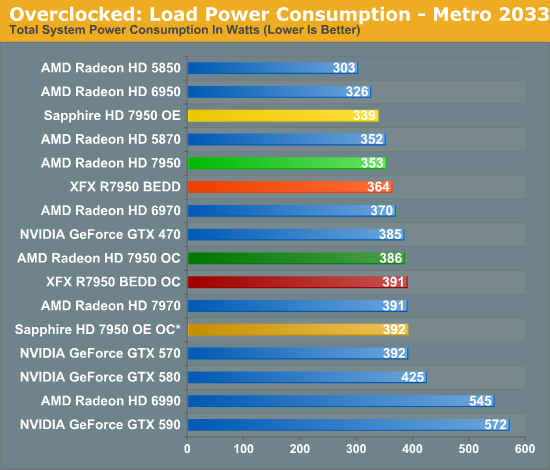
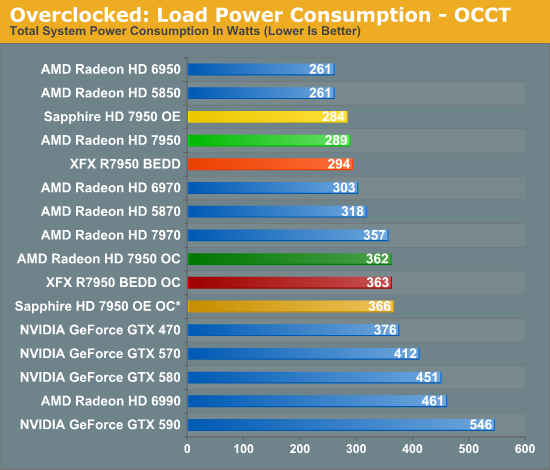
Even though we’re not increasing the voltage on our AMD and XFX cards, merely overclocking them and raising the PowerTune limit to avoid throttling does drive the power consumption up. As is typical with heavily overclocked cards, overclocking quickly drives up power consumption and the 7950s are no exception. After overclocking power consumption is almost identical to the stock 7970, so while you can get 7970 performance you still need to pay the price with 7970 power consumption. Meanwhile it’s interesting to note that even with the extra 0.1v we’ve given the Sapphire card its final power consumption is only ever so slightly higher than the other 7950s, proving that voltage is the great equalizer in this case.
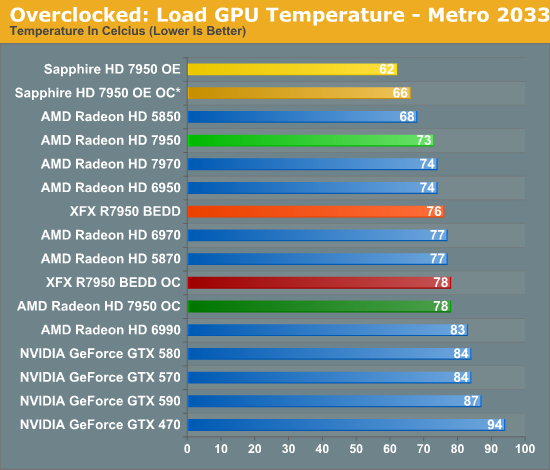
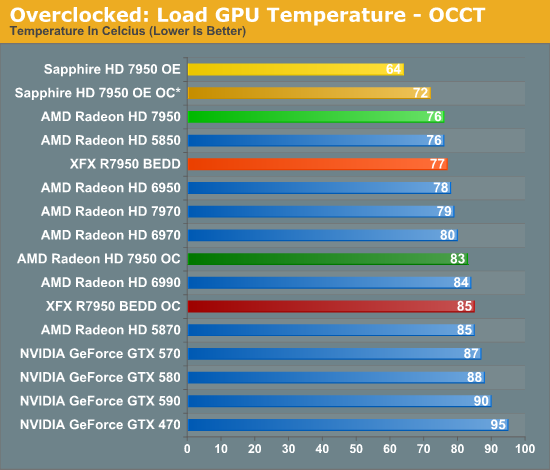
With the increase in power comes an increase in temperatures. The Sapphire card still does very well here staying in the low 70s even under OCCT, while the reference and XFX cards hit the high 70s under Metro and mid 80s under OCCT. As we’ve yet to really ascertain what the thermal limits are for Tahiti, it’s not clear whether there’s too much thermal headroom left for the GPU, particularly under OCCT.
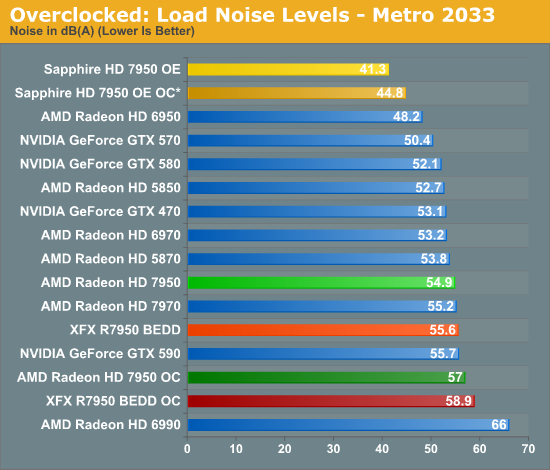
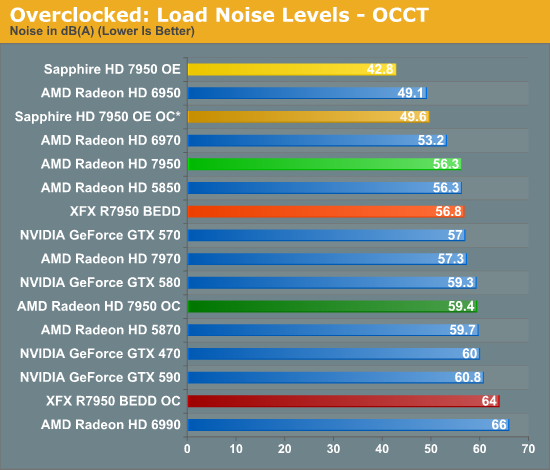
Last but not least we have load noise. The Sapphire card is once more a stellar performer, and we still can’t get it above 50dB even with OCCT. Unfortunately the XFX 7950 BEDD has its biggest fallout yet—it may be able to overclock well, but at 64dB under OCCT the performance isn’t going to be worth the immense amount of noise it creates to move enough air to keep the GPU cool.










259 Comments
View All Comments
Prosthetic Head - Friday, February 3, 2012 - link
I purchased a second hand 4850 and put a nice custom cooler on it about 3.5 years ago. It runs near silent and performs more than adequately in all the games I play. I honestly don't see the excitement in GPU announcements unless they really are game changers (59XX, 9800XT --> 6800, X800 type leaps). I realise I'm not a bleeding edge gamer & some of you are and thats great - It means second hand high end GPUs available regularly for the same price as low end offerings less than a year later.The only thing that tempts me about the new architectures is the compute performance. I actually use this for some computational chemistry work and the upgrade looks well worth it if I do more of this type of work.
The improving performance / power ratio is also of interest since I don't like loud fans, hot computers or excessive electricity consumption.
Galidou - Saturday, February 4, 2012 - link
Don't worry, chizow is a fanboy, there's nothing to do against greenies, they have a closed mind :PHe never said anything wrong about nvidia but sure has a ton of things to say about AMD. He speaks of overclockability of GTX 580, get an answer about how overclockable the 7970 and then changes his mind and says he cares about OC but not much about stock cards OC(which the 7970 seems to do VERY well).
Makes no sense when you say things and then right after what you say has no value for the other team.....
chizow - Saturday, February 4, 2012 - link
No, I said it makes no sense to compare one stock part to one that's overclocked. If you want to compare apples to apples, you overclock both, I have no problem with that and I think you'll find that both parts overclock similarly so the original difference in stock performance holds true.Only a fanboy would try to compare stock to OC results as you and others apparently tried to do.
Galidou - Sunday, February 5, 2012 - link
I never tried to compare any video card, I'm a proud owner of both camps video card, from geforce 2 gts all the way up to 6850 in crossfire and gtx 560 ti in other rig... thing is you never said anything wrong about Nvidia and I can say wrong things and good things about both camps being an owner of MULTIPLE of their cards...Someone with only one side of a story shouldn't be used as a reference for righteousness in judgement... Like taking a judge for an affair of murder while the judge himself is in the family of the murdered one.....
Anyway just my two cents...
chizow - Sunday, February 5, 2012 - link
If you never tried to compare any video card, why are you defending someone who did then?As usual with these kinds of threads arguing with ignorant fanboys, I'm simply keeping things honest and correcting erroneous flaws in facts or logic.
Does it make sense to you to make a comparison about one overclocked part compared to another stock part, then declare the OC'd part the winner based on those results?
Of course not!
As for your two cents, keep them, you will need to save every penny to make the jump from 6850 or GTX 560ti to 7950s at these prices.
Galidou - Sunday, February 5, 2012 - link
There was bad things about AMD and Nvidia in history and thing is you can only mention bad things from one side. I'd never listen to someone that already has a choosen side to speak about ANYTHING in my whole life, simply because you won't be able to hear the absolute truth from the defender of only one side...chizow - Saturday, February 4, 2012 - link
No, but you were talking about me. So, please explain what you think determines pricing in this market since you insist I have no clue, or YOU shut up.Thanks!
chizow - Saturday, February 4, 2012 - link
Yes of course, because it would be negligent not to from any perspective.Anyone who buys something at any point needs to project the market, needs to weigh the potential for obsolescence. That's a large reason why companies do NOT disclose unannounced products as not to erode their own sales before a product goes EOL.
Similarly, it would be negligent if AMD didn't project Nvidia's next-gen parts given they use the same fab and process. And right now, AMD is basically telling you with this price that they either 1) are ignoring Nvidia's 28nm partsor 2) think Nvidia's 28nm parts perform the same as their 40nm parts or 3) don't think their customers are smart enough to realize 1 or 2.
Either way, they're going to look the fool once Nvidia does release their 40nm parts.
chizow - Saturday, February 4, 2012 - link
You mean the super-OC'd Classified 3GB versions that perform within a few % points of the 7970? Yeah of course there are. You'd be a moron not to realize the difference, or you're just being dishonest. With you it could be either.Most 580s are in the same price range as the 7950, $440-500, because once again, they deserved that price tag when they launched 14 months ago and the release of the 7950 has done nothing to make Nvidia drop the price on them.
But as I said, this price and performance level will be retired soon, but obviously not as a result of the "next-gen" Tahiti parts. We'll most likely have to wait for the real "next-gen" parts with Kepler to shift this stagnant price:performance metric.
chizow - Saturday, February 4, 2012 - link
No, only a moron would blow $500 on another card a year later that performs the *SAME* as the card they paid $500 for a year earlier. And that's why the 7950's pricing sucks.There's light at the end of the tunnel, you may finally be getting it lol.